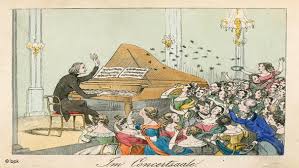Which dead celebrity would you most like to have sex with?
I don’t even have to think about my answer. There’s close competition from Jeff and Tim Buckley, and I always had kind of a crush on Philip Seymour Hoffman, but give me Franz Liszt circa 1840 and all others pale by comparison.

Hungarian composer and virtuoso pianist Franz Liszt (1811–1886). Be honest: you wouldn’t kick him out of bed on a cold night.
(Editor’s note: This is the post that immediately loses me all the new subscribers I picked up yesterday… It’s mostly an extravagant preamble, an Oscar Wilde-style ‘eloquent circumlocution’ if you like, to point you towards my new page – up above – called ‘Music to Write to, which I hope you’ll take a gander at, even if you drop out HERE and read no further…)
Liszt was a rock god before rock gods were invented. Women collected the butts of his cigars and wore them on chains around their necks. They swooned at concerts. They abandoned their husbands for him. They wrote novels about him. I’m certain they’d have thrown their knickers at him if not for the peskily-awkward nature of Victorian fashion.
And did all this adulation turn Liszt into a massive cock?
Well, probably. At first. But he was also (Lynsey pulls sad face) devoutly religious (except for the ‘thou shalt not fornicate bit’; but if you look like Liszt and you play piano like Liszt and you don’t fornicate, you’re certifiably insane I reckon. Even God on his cloud was, like, ‘eh, go on, then, ya scallywag’.) He was a bit of a Big Head, it has to be said: ‘Génie oblige!’ was one of his sayings – nothing to do with a man in silk trousers granting you three wishes, but rather a twist on the ‘noblesse oblige‘ idea that those with money and power were meant to do their bloody bit for others. Likewise, those who were… well, geniuses (oh go on, let him off; he was a genius) were required to step up and… um… share themselves. (All credit to Liszt, he did share himself admirably well.) Génie Oblige finds its contemporary expression in Spiderman’s dictum that ‘with great power comes great responsibility’. Bet you never thought Liszt and Spiderman would be likely bedfellows, but there you are. We none of us know what life (or, indeed, this blog) will bring our way.
All of which is a STUNNINGLY LONG-WINDED way of saying that Liszt played his concerts for free.
For free.
That’s right. Just like the millionaire rock stars of today, who feel they probably have enough money already (how many houses, helicopters, pool tables, swimming pools, etc, does one rock star need?) and they want to thank their fans by…
Charging them as much money as possible.
Lovely.
For years Liszt was nothing to me but a painting on an album cover: a compilation of his Hungarian rhapsodies. Then, one night, I was reading a book about Chopin and, much as I love Chopin, whenever Liszt came striding in he swiped the scene from under Chopin’s pointy nose. While Chopin was pining for Georges Sand and palely coughing, Liszt was charming the copious undergarments from virtually everyone except Clara Schumann (who loathed him) and running away to an island with Marie D’Agoult and being twice as charismatic as Emma Thompson on the Graham Norton Show (and that was a whole lot of charismatic) crossed with Benedict Cumberbum and a side order of Christopher Walken in King of New York.
In fact, before Madder Hall came along, I was planning a 12-part novel based on Liszt’s Transcendental Études for solo piano… Now, calm down, I know that excites you, but don’t all squeal at once, please: this is an Englishwoman’s blog. I’ll get an attack of the vapours if you keep on like that.
(Heard the oddly-quiffed Evgeny Kissin play this live at the Barbican last year, and practically went into the stratosphere, such was my delight.)
I strongly suspect that everyone’s packed away their pencil case and gone home for their tea now, because you probably all heard the school bell about seven paragraphs ago, while I was enjoying myself on one of my favourite topics. Am I alone now? (As Tiffany nearly sang.) If so, I could literally write anything I wanted to…
Image source
Just getting a cat to stroke…
Right, back now. Plus cat.
As I said at the start of this L O N G post, I’m in a musical kinda mood because I’ve just stuck a brand new page at the top of the site, and it has lots of musical links you mightn’t have come across before, and there might just be something to tickle your fancy. So do check it out.
And, partly, I suppose I’m trying out ideas for Book Number 2. Book Number 2 is going to be musical. I don’t mean it’ll come with a birthday-card jingle inside (although, hmm, there’s an idea…) or a Jamie Oliver style CD-to-cook-to (could you be any more twee and middle class and faintly annoying, Jamie?). I mean it’ll be about music. (Except it won’t, of course. It will be about having sex and then dying, which I what I always seem to write about.)
It won’t be about Liszt, though. Because Liszt is sort of in Madder Hall. And if you visit my About Me page you can hear me describing the character he inspired.
PS: for those who’re interested, my NaNo word count stands at 43,726. As of 10.04 this morning.
P.P.S. Just realised I told my friend Jon, over coffee yesterday, that this would be about raspberries. (Perhaps it should have been.)







